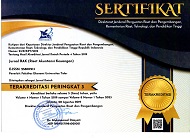Title:
DETERMINAN PERSEPSI DALAM PENGAMBILAN KEPUTUSAN ETIS PENGGELAPAN PAJAK
Author:
Abstract
Penelitian ini bertujuan untuk menguji hubungan antara orientasi etis (ethical orientation) yang ditandai dengan idealisme dan relativisme dengan pengambilan keputusan etis dalam penggelapan pajak. Selain itu, penelitian ini juga ingin menguji faktor-faktor individual seperti gender dan tingkat religiusitas sebagai penentu pengambilan keputusan etis. Survey dilakukan dengan menggunakan kuisioner kepada mahasiswa Jurusan Akuntansi Fakultas Ekonomika dan Bisnis Universitas Lambung Mangkurat. Teknik analisis yang akan digunakan adalah dengan regresi berganda. Hasil penelitian menunjukkan bahwa idealisme tidak terbukti berhubungan negatf dengan keputusan etis penggelapan pajak. Sedangkan relativisme yang juga merupakan unsur orientasi etis terbukti berhubungan positif dengan persepsi keputusan etis penggelapan pajak. Tingkat religiusitas terbukti berhubungan negatif dengan persepsi keputusan etis penggelapan pajak. Gender juga terbukti mempengaruhi persepsi keputusan etis penggelapan pajak dimana responden wanita terbukti 6.5% lebih tinggi menilai bahwa penggelapan pajak merupakan perilaku yang tidak etis dibandingkan dengan responden pria.
Keywords
Full Text:
PDFReferences
Allport, G. W., & Ross, J. M. (1967). Personal religious orientation and prejudice. Journal of Personality and Social Psychology, 5(4), 432–443. https://doi.org/10.1037/h0021212
Azizie, H. (2008). Variabel-Variabel yang Mempengaruhi Pembayaran Zakat oleh para Muzakki. Universitas Gadjah Mada.
Clark, J. W., & Dawson, L. E. (1996). Personal religiousness and ethical judgements: An empirical analysis. Journal of Business Ethics, 15(3), 359–372. https://doi.org/10.1007/BF00382959
Cunningham, W. P. (1998). The Golden Rule as Universal Ethical Norm. Journal of Business Ethics, 17(1), 105–109. https://doi.org/10.1023/A:1005752411193
Deshpande, S. P. (1997). Managers’ Perception of Proper Ethical Conduct: The Effect of Sex, Age, and Level of Education. Journal of Business Ethics, 16(1), 79–85. https://doi.org/10.1023/A:1017917420433
Fernando, M., & Chowdhury, R. M. M. I. (2010). The Relationship Between Spiritual Well-Being and Ethical Orientations in Decision Making: An Empirical Study with Business Executives in Australia. Journal of Business Ethics, 95(2), 211–225. https://doi.org/10.1007/s10551-009-0355-y
Fernando, M., Dharmage, S., & Almeida, S. (2008). Ethical Ideologies of Senior Australian Managers: An Empirical Study. Journal of Business Ethics, 82(1), 145–155. https://doi.org/10.1007/s10551-007-9568-0
Forsyth, D. R. (1980). A Taxonomy of Ethical Ideologies. Journal of Personality and Social Psychology, 39(1), 175–184.
Fort, T. L. (1997). Religion and Business Ethics: The Lessons from Political Morality. Journal of Business Ethics, 16(3), 263–273. https://doi.org/10.1023/A:1017935210929
Gordon, J. (1993). A Diagnostic Approach Organization Behavior (4th ed.). A Division of Simon and Schuster.
Hunt, S. D., & Vitell, S. (1986). A General Theory of Marketing Ethics. Journal of Macromarketing. https://doi.org/10.1177/027614678600600103
Husein, M. F. (2003). Keterkaitan Faktor-Faktor Organisasional, Individual, Konflik Peran, Perilaku Etis dan Kepuasan Kerja Akuntan Manajemen. Universitas Gadjah Mada.
Jones, T. M. (1991). Ethical Decision Making by Individuals in Organizations. The Academy of Management Review, 16(2), 366–395. https://doi.org/10.5465/AMR.1991.4278958
Keller, A. C., T. Smith, K., & Smith, L. M. (2007). Do gender, educational level, religiosity, and work experience affect the ethical decision-making of U.S. accountants? Critical Perspectives on Accounting, 18(3), 299–314.
Keraf, A. S. (1998). Etika Bisnis: Tuntutan dan Relevansinya. Yogyakarta: Kanisius.
Khraim, H. (2010). Measuring Religiosity in Consumer Research From an Islamic Perspective. Journal of Economic and Administrative Sciences, 26(1), 52–78. https://doi.org/10.1108/10264116201000003
Matlin, M. W. (1998). Cognition (4th ed.). New York: Harcourt Brace College Publisher.
McGee, R. W., Ho, S. S. M., & Li, A. Y. S. (2008). A comparative study on perceived ethics of tax evasion: Hong kong vs the united states. Journal of Business Ethics, 77(2), 147–158. https://doi.org/10.1007/s10551-006-9304-1
Meliyanah. (2008). Persepsi Etis Mahasiswa Terhadap Praktik Earning Manajemen. Universitas Gadjah Mada.
Nugroho, R. (2008). Gender dan Administrasi Publik. Yogyakarta: Pustaka Pelajar.
Robbins, S. P. (1997). Perilaku Organisasi (diterjemahkan oleh Pujaatmaka). Jakarta: PT. Prenhallindo.
Setyawan,Supanji & Purwanti, Endang. 2016. nilai tambah dan profitabilitas komoditas kelapa di kabupaten natuna. Jurnal RAK (Riset AKuntansi Keuangan) Volume 1 nomer 1 2016.
Sitanala, T. F. (2010). Faktor-Faktor yang Mempengaruhi Skeptisisme Auditor. Universitas Gadjah Mada.
Smith, P. L., & Oakley, E. F. (1997). Gender-Related Differences in Ethical and Social Values of Business Students: Implications for Management. Journal of Business Ethics, 16(1), 37–45. https://doi.org/10.1023/A:1017995530951
Song, Y., & Yarbrough, T. E. (1978). Tax Ethics and Taxpayer Attitudes: A Survey. Public Administration Review, 38(5), 442–452. Retrieved from http://www.jstor.org/stable/975503
Stack, S. (1998). Gender, Marriage, and Suicide Acceptability: A Comparative Analysis. Sex Roles, 38(7), 501–520. https://doi.org/10.1023/A:1018770124576
Supramono, & Damayanti, T. W. (2010). Perpajakan Indonesia Mekanisme dan Perhitungan. Yogyakarta: Andi Publisher.
Trevino, L. K. (1986). Ethical Decision Making in Organizations: A Person-Situation Interactionist Model. The Academy of Management Review, 11(3), 601–617.
Treviño, L. K., Weaver, G. R., & Reynolds, S. J. (2006). Behavioral ethics in organizations: A review. Journal of Management (Vol. 32). https://doi.org/10.1177/0149206306294258
Utami, T. G., & Widodo, A. (2015). Persepsi Mahasiswa Akuntansi Dan Mahasiswa Hukum Terhadap Etika Penggelapan Pajak. Jurnal Akuntansi Dan Bisnis, 15(2), 96–105.
UU No 28 Tahun 2007. (2007). Perubahan Ketiga Atas Undang-Undang Nomor 6 Tahun 1983 Tentang Ketentuan Umum Dan Tata Cara Perpajakan.
Varosi, T. R., Klamm, B. K., & McCrohan, K. F. (2000). The Effect of a Salient Tax Avoidance Situation On Propensity to Evade Income Taxes. Research On Accounting Ethics, 7, 65–81.
Velasquez, M. G. (2006). Business Ethics Concepts and Cases. New Jersey:
DOI: https://doi.org/10.31002/rak.v3i1.651
Article Metrics
Abstract view : 510 timesPDF - 0 times
Cited By
Refbacks
- There are currently no refbacks.
This work is licensed under a Creative Commons Attribution-ShareAlike 4.0 International License.
Jurnal RAK (Riset Akuntansi Keuangan)
P-ISSN: 2541-1209 E-ISSN: 2580-0213
published by : Accounting Department Faculty of Economics, Universitas Tidar













 Abstract views : 510
|
Abstract views : 510
| PDF views : 0
PDF views : 0
